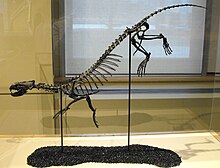
Back Puijila darwini Catalan Puijila Czech Puijila darwini German Puijila darwini Spanish Puijila French Puijila GL פואיג'ילה HE Puijila darwini Italian プイジラ Japanese Darvino puijila LT
| Puijila | |
|---|---|

| |
| Restored skeleton | |
| Scientific classification | |
| Domain: | Eukaryota |
| Kingdom: | Animalia |
| Phylum: | Chordata |
| Class: | Mammalia |
| Order: | Carnivora |
| Family: | †Semantoridae |
| Genus: | †Puijila Rybczynski et al., 2009 |
| Species: | †P. darwini
|
| Binomial name | |
| †Puijila darwini Rybczynski et al., 2009
| |
Puijila darwini is an extinct species of stem-pinniped (seal) which lived during the Miocene about 21 to 24 million years ago. About a metre (3 feet) long, the animal had only minimal physical adaptations for swimming. Unlike modern pinnipeds, it did not have flippers and its shape was otter-like, albeit more specialized; its skull and teeth are the features that most clearly indicate that it is a seal.[1]
It is considered to be the most primitive pinnipedimorph yet found. The genus name is an Inuktitut word for a young seal; the species name honours Charles Darwin.[2] The holotype and only known specimen is a nearly complete fossil skeleton. It is housed at the Canadian Museum of Nature, Ottawa, Ontario.
- ^ Ed Yong (2009-04-22). "Puijila, the walking seal – a beautiful transitional fossil". Not Exactly Rocket Science. Discover Magazine. Archived from the original on 3 November 2012. Retrieved 2014-10-07.
- ^ "Puijila: A prehistoric walking seal". Puijila: A prehistoric walking seal. Canadian Museum of Nature. Archived from the original on 2015-06-21. Retrieved 2014-10-07.